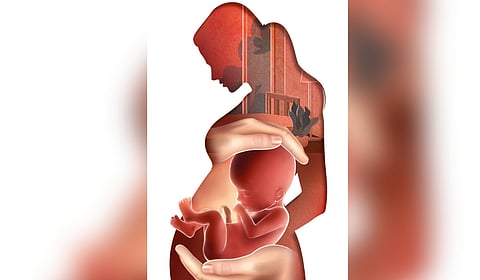

KOZHIKODE: On a Tuesday morning in a rented home in Chattiparamba, Asma gave birth to her fifth child — a baby boy. Hours later, the 35-year-old mother was no more; no doctor, no nurse, no ambulance, not even a hospital bed to help revive her. She left behind a family and an unverified certificate in acupuncture, believed by many to be a licence to deliver life. (Her husband Sirajuddin possesses the same certificate, sources said.) But for Asma, and many others, it has proved a certificate of risk — and death.
As cases of home births spike across Kerala — especially in Malappuram, which topped the state in 2023-24 with 250 reported home deliveries — experts are sounding the alarm over a troubling trend: The increasing use of short-term acupuncture training as justification for performing unsupervised births.
These so-called practitioners claim legitimacy through certificates obtained after completing three- or six-month courses in acupuncture — often from unrecognised institutions. But medical professionals and legal experts argue these credentials are neither recognised nor suitable for life-threatening medical scenarios like childbirth.
“There is no scientific basis for using acupuncture during labour,” says Dr Abdul Gafoor, head of the Institute of Traditional Chinese Acupuncture - Moxibustion and Research Centre, Kozhikode, and state president of the Acupuncture Science Association. “Acupuncture, as per the World Health Organization, is the second most developed system of traditional medicine globally. But it is never to be used in emergencies — especially during labour or childbirth.”
He warns that in Kerala, an illegal version of acupuncture called “no-touch therapy” has gained traction. “They don’t believe in diseases, so they don’t believe in medicine, blood tests, or surgeries. And that’s dangerous,” he adds.
Specific conditions
Acupuncture, when legally practised in India, is allowed under specific conditions. The Indian Research Institute for Integrated Medicine offers certified programmes such as the PG certificate in acupuncture (for MBBS holders), a medical degree in acupuncture, and an assistant-level certificate. But these do not authorise independent emergency care or delivery assistance.
“What we’re seeing in Kerala are underground institutions handing out fake certificates, with no regulation and no scientific rigour,” says district medical officer Dr R Renuka. “These people are performing dangerous medical procedures with nothing more than a diploma printed off a computer.”
As per a study published last year, acupuncture has no proven benefit in reducing labour pain. Despite its growing popularity among women seeking “natural” alternatives to medical childbirth, researchers concluded that inserting needles into the skin did not help manage labour pain. “The data is clear. It doesn’t help — and worse, it can delay life-saving interventions,” she says.
So why do people continue to choose home births, often in risky environments? For some, it’s rooted in distrust of modern medicine. For others, it’s about cost, convenience, or fear. In a few cases, it’s a deeper ideological belief that childbirth is “natural” and should be untouched by what they see as the poisons of modern intervention — surgeries, blood work, and injections.
‘Offering false hope’
But this belief system, as medical expert say, is being manipulated. “These so-called practitioners are exploiting fear, offering false hope, and putting lives at risk,” says Malappuram MLA P U Ubaidulla. “We need strong awareness campaigns like we had for vaccinations. Home births may look peaceful, but when something goes wrong, there’s no turning back.”
District panchayat president M K Rafeekha echoed the concern. “The news is shocking. We are planning a ward-level intervention using social media and meetings to prevent such tragedies.”
But as officials scramble to put out fires, the ground reality remains grim. Over 90% of couples involved in reported home birth cases had completed just a short-term diploma in acupuncture, and many believed it qualified them to handle labour.